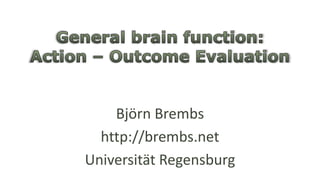This is a response to Dorothy Bishop’s post “Who’s afraid of open data?”. After we had published a paper on how Drosophila strains that are referred to by the same name in the literature (Canton S), but came from different laboratories behaved completely different in a particular behavioral experiment, Casey Bergman from Manchester contacted me, asking if we shouldn’t sequence the genomes of these five fly strains to find out how they
Messaggi di Rogue Scholar

While the first day (day 2, day 3) was dominated by philosophy, mathematics and other abstract discussions of chance, this day of our symposium started with a distinct biological focus. Martin Heisenberg, Chance in brain and behavior First speaker for this second day on the symposium on the role of chance in the living world was my thesis supervisor and mentor, Martin Heisenberg.
For our course this year I was planning a standard neurogenetic experiment. I hadn’t ever done this experiment in a course, yet, just two weeks ago I tried it once myself, with an N=1. The students would get two groups of Drosophila fruit fly larvae, rovers and sitters (they wouldn’t know which was which). About ten larvae from each group would be placed on one of two yeast patches on an agar plate.

Last week, Elizabeth Pennisi asked me to comment on the recent paper from Schreiweis et al. entitled “Humanized FoxP2 accelerates learning by enhancing transitions from declarative to procedural performance”. Since I don’t know how much, if anything, of my answers to her questions will end up in her article, I thought I might expand my answer into a post about this very interesting work.
Today, our most recent paper got published, before traditional peer-review, at F1000 Research . The research is about how nominally identical fly stocks can behave completely differently even if tested by the same person in the same lab in the same test.
This is the story behind our work on the function of the FoxP gene in the fruit fly Drosophila (more background info). As so many good things, it started with beer. Troy Zars and I were having a beer on one of the ICN evenings, I think it was in Vancouver in 2007. I had recently learned about the conserved role of FoxP2 in songbirds, out of one of the labs in Berlin, where I was based at the time.
The data clearly show that publications in Cell , Nature or Science ( CNS for short), on average, cannot be distinguished from other publications, be it by methodology, reproducibility or other measures of quality. Even their citation advantage, while statistically significant, is so small that it is practically negligible.

[Image design: Serial/Trash]{style=“font-family: "arial" , sans-serif; line-height: 150%;”} [A number of genes have been implicated in neurodegenerative diseases such as amyotrophic lateral sclerosis (ALS), also known as motor neurone disease, and Frontotemporal lobar degeneration (FTLD). However, the core biological processes involved in these disorders are extremely difficult to model and this is hampering the effort to develop treatments.
This year’s Winter Conference on Animal Learning and Behavior (WCALB) will be on one of my oldest and most central research projects, the commonalities and differences between operant and classical conditioning.